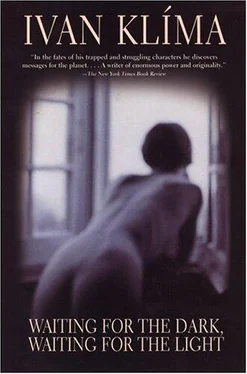'The sons visit him again. They find that his studio is now empty. Only a few blocks of unworked wood remain, and the carving of a bird with its wings outstretched. They try to persuade their father to give up. They shout at him: you've gone mad, you should get help. He throws them out.
'He probably should seek a doctor's help, but instead he continues his search. In his life now there passes a procession of landscapes, cities, rectories, monasteries. Almost illegible documents flash before his eyes. The letters seem to dance and recompose themselves into words and names. Other landscapes and other people enter his life, people long since lost, of whom only a name remained, yet he sees them. Once, he sees them as if in a wedding procession, dressed in ancient costumes, walking to the sounds of Gregorian chant to a small church set on a white rock. At other times he sees his ancestors in a band of warriors filing along a jungle path and dancing half-naked around fires. He hears the hunters cheer when they strike down their prey. The images increase. At first they come to him only at night, then they begin appearing by day as well. He looks at the sea and suddenly sees a line of warships — triremes— nearing the shore. Or, from the window of an inn, he catches a glimpse of twelve lictors in togas. Once he notices that he is being watched from a distance by a hairy man with a low, sloping, simian forehead. The man is gripping a club in his enormous right hand. He stops to allow the man to catch up with him, but he merely circles around him, as though skirting a circle whose perimeter he cannot enter. This happens several days in a row, until one
night the man finally appears by his bedside. He asks the man what he wants, but he knows the man will not reply: he is from a different space, and is of a different essence. He is merely a shadow of someone more ancient from whom he is descended.
'Then the shadows visit him more frequently. They come to him in his studio. They sit around in corners, or at night they stand around his bed and sometimes he can hear them whispering among themselves. Sometimes he can understand fragments of sentences, and he jumps out of bed and, with his left hand, scribbles down what they are apparently trying to tell him: If I have at last found mercy before thy face. . nearer to thee, our Lord, nearer to the fire. . clay from clay, ashes from ashes, dust from dust, life from death. . O, bow down to the powerful and lead our souls into. . Sometimes he even tries to sketch the faces. The wild, hairy faces of the men and the bare faces of the women. Their low foreheads, flattened noses and tiny chins give them a savage, almost animal look. Their names too begin to sound stranger and stranger. They are short and often remind him of the cry of birds, the sounds of animals or the howling of the wind. He learns that SiSiSi was the friend of Tektek, but when, for how long and where he lived, he cannot discover. He tries to summon him forth again, but none of the shadows ever returns, as though they have to make room for others. They begin to behave with more and more abandon, their sentences become less coherent, then they utter single words, then stuttering syllables, and finally they seem to interpolate animal yelps among the syllables. The savage howling of ancient beasts of prey, the deep throaty roar of bears and, almost constantly now, the hiss of approaching snakes and the slurping yawn of mussels and clams. It's exhausting. He still tries to sketch the outlines of these shadows but he can no longer perceive their shapes. Perhaps they no longer have a shape, perhaps their shapes are decayed by time; he can only see coloured, blurred spots that fly and circle around him.
'Then his strength runs out. He no longer gets out of bed. He only looks on as the luminous half-forms dance, and listens to the noises that draw together and blend until
they sound like rushing water. He feels that he's no longer lying down, but falling. He falls into depths that are more bottomless than the sky, and as he falls the light around him becomes calm and clear, the sounds blend into a single tone, a penetrating whistle, which permeates him so that he no longer knows whether it's coming from outside or from within. At that moment he understands that he is perceiving the divine presence, the presence of God, and he whispers, God: his last word.
'They find him in the middle of the empty studio, lying among scraps of paper covered with words in an incomprehensible language and sketches of improbable creatures. The dead man is smiling. One of those who find him says, "The poor bugger must have gone off his rocker."'
The room is silent, like the dead man's studio. Perhaps she had fallen asleep, but her eyes were staring wide into the darkness outside the window. 'And the bird. What about the raven?' she asked finally.
'I forgot about him.' Her question disappointed him. 'He discovers that one of his ancestors had the nickname Corvus.'
'That's a strange story. It's not the kind of story I'd expect from you. It's as though someone else had invented it, someone else inside you, someone who longs to have faith in something.' She leaned over to him and began to kiss him, her cheeks damp with tears. He didn't know if she was crying because the story moved her, or because she was sorry for him, or because they were about to part.
What was faith?
Faith was a longing that pretended to be a conviction.
The noise in the room suddenly stopped. Then a powerful male voice announced that they needed five messengers to go out into the countryside that very night. They would need to be prepared for any eventuality because the situation in the countryside was unclear, and they had unconfirmed reports that armed militia units were standing by at the outskirts of the city, ready to intervene. The voice listed all the places the messengers were to go, the most distant of which was at the far end of the country. Volunteers immediately stood up.
At that moment he heard Sokol's voice offering them the use of the television van.
So he got up. It seemed unlikely that there would be any shooting, but if so, and he and his camera were to survive, he would get some unique footage, though of course there always was shooting somewhere in the world, and that kind of unique footage always looked the same.
A long-haired boy and a girl whose face was still that of a child got into the van. Other students brought a bundle of posters and some flyers.
As they left he looked out of the window and saw several hands waving at them. It was the first time strangers had ever waved to a car in which he was sitting. Both the kids were sitting beside him talking quietly about people he didn't know. The girl addressed the boy as Dan, and the boy called her Dora.
It was already past midnight, and the streets were completely empty. There was no sign of militia units.
He pulled out a packet of cigarettes and offered them to the students beside him. The young man refused; the girl accepted and he lit it for her. She noticed that his lighter was shaped like a tiny revolver. 'It's a good thing we're armed,' she remarked.
'We don't shoot in this country,' said the boy — as though he could remember. 'When the shooting starts, someone has to come from somewhere else to deal with it.'
'You can kill without shooting,' countered the girl.
'Have they killed anyone you know?' he asked her.
'No one I know,' she replied, 'but that's not important. You can poison people so slowly that no one notices.'
'Do you mean with television?'
'That's possible,' she said, 'but there are lots of ways of doing it. Like the way they poisoned us at school for fifteen years.'
'Are you counting nursery school?'
'That's where it starts.' She laughed. 'But now it's all over.'
Читать дальше











